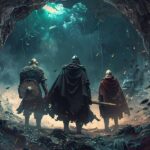In the ever-expanding landscape of creative storytelling, new worlds and characters continually emerge, capturing the imagination of audiences. Among the many unique and curious figures, Derpoori and Twiboor stand out as enigmatic characters that provoke intrigue. These characters, hailing from an inventive universe where both absurdity and depth coexist, carry with them rich histories, strange customs, and complex relationships that invite exploration.
This article is a comprehensive guide to Derpoori and Twiboor, delving into their backstories, personalities, relationships, and the symbolism behind their existence. From their origin stories to their role in the larger narrative, we will unpack the layers of meaning embedded in their creation and offer insight into how they fit within the universe they inhabit. By the end of this guide, you’ll have a clear understanding of who Derpoori and Twiboor are, the key elements of their stories, and the thematic undertones that define their roles.
Origins and Backstory
Derpoori is a character shrouded in both mystery and oddness, often described as a figure who doesn’t quite fit the mold of typical heroes or anti-heroes. He originates from a world that is characterized by contradictions—where logic and absurdity are woven together, creating a reality that defies straightforward categorization. Derpoori’s world, known as Flimboria, is a bizarre realm where the rules of physics seem more like suggestions and where societal norms shift like sand.
Derpoori’s backstory involves a pivotal moment where he discovers a peculiar artifact known as the “Whispering Mirror,” which reflects not just physical images but also the thoughts and desires of those who look into it. The discovery of this mirror triggers a series of events that thrust Derpoori into a quest he did not ask for but cannot avoid. He is neither a willing hero nor an outright villain; rather, he is an ambiguous figure constantly navigating the fine line between helping others and succumbing to his own self-interest.
Personality and Traits
Derpoori’s personality is marked by indecision and confusion, traits that are reflected in his actions and decisions throughout his journey. At his core, Derpoori is a reluctant adventurer—he is not drawn to glory or riches, but rather stumbles upon adventure almost by accident. His personality combines elements of skepticism, wit, and an awkward sense of humor that borders on self-deprecation. Derpoori often feels like an outsider, even in his own world, constantly questioning his place in the grander scheme of things.
At times, his indecision and uncertainty lead him into trouble, while at other moments, they save him from making rash decisions. He is a character who embodies the chaos and unpredictability of life, refusing to conform to a singular, heroic archetype. Instead, he exists in a state of perpetual conflict—both with himself and the world around him.
The Whispering Mirror
One of the most significant objects associated with Derpoori is the Whispering Mirror. This artifact plays a key role in his journey, symbolizing both the allure of self-discovery and the dangers of introspection. The mirror has the ability to reflect not only what Derpoori looks like on the outside, but also his internal conflicts, fears, and desires.
As Derpoori stares into the mirror, he is confronted with unsettling truths about himself—truths he may not be ready to face. This leads to moments of doubt and confusion, but also sparks moments of growth and revelation. The mirror is a metaphor for the complexity of self-perception, reminding us that seeing our true selves often requires confronting uncomfortable realities.
Origins and Backstory
Twiboor, in stark contrast to Derpoori, comes from a place of structure and order. She hails from a different realm known as Veeropolis, a society that prizes logic, efficiency, and rigid adherence to rules. Twiboor’s origins are tied to her role as a Keeper of the Ledger, a title given to those responsible for maintaining the balance of order in Veeropolis. In this society, everything from the weather to individual behavior is meticulously planned and cataloged.
Twiboor was raised to believe in the absolute necessity of control, and her early life was shaped by the belief that chaos is the enemy of progress. However, her worldview is challenged when she meets Derpoori, whose very existence seems to embody the randomness and unpredictability she was taught to suppress. This meeting marks a turning point in her life, as she begins to question the rigid structure of her society and her role within it.
Personality and Traits

Twiboor’s personality is defined by her intelligence, precision, and sense of duty. She is calm, calculating, and often appears detached, especially in comparison to Derpoori’s erratic behavior. Twiboor values order above all else and finds comfort in rules and regulations, often using them as a shield against the chaos of the world.
However, beneath this composed exterior lies a curiosity that has been repressed for most of her life. As her journey with Derpoori unfolds, Twiboor begins to embrace aspects of her personality that she had long denied—her desire for freedom, adventure, and the unknown. This inner conflict between her structured upbringing and her emerging curiosity creates one of the most compelling aspects of her character.
The Ledger of Veeropolis
Twiboor’s defining object is the Ledger of Veeropolis, an enormous book that contains the rules and regulations governing every aspect of life in her world. The ledger is not just a guide; it is considered a sacred text in Veeropolis, representing the very foundation of their society. Twiboor, as a Keeper of the Ledger, is entrusted with ensuring that its rules are followed to the letter.
However, as Twiboor begins to question the inflexibility of the ledger, she realizes that it may not hold all the answers she once believed it did. This growing skepticism leads her to challenge the status quo of Veeropolis and embrace a more flexible, open-minded approach to life. The ledger, like Derpoori’s mirror, symbolizes her inner struggle—her loyalty to order and her burgeoning desire for freedom.
Part 3: The Relationship Between Derpoori and Twiboor
The dynamic between Derpoori and Twiboor is one of contrasts—chaos and order, intuition and logic, unpredictability and precision. Yet, despite their differences, the two characters are deeply connected by their shared journey of self-discovery. Their relationship is not one of traditional romance or rivalry, but rather a partnership forged by necessity and mutual respect.
As they embark on their adventures together, Derpoori and Twiboor learn from one another in profound ways. Derpoori’s chaotic nature forces Twiboor to loosen her rigid adherence to rules, while Twiboor’s structured thinking helps Derpoori navigate the complexities of their journey. In this sense, they are complementary forces—each providing balance to the other in a way that neither could achieve alone.
Symbolism of Chaos and Order
At the heart of Derpoori and Twiboor’s relationship is the symbolic tension between chaos and order. Derpoori represents the unpredictable, the wild, and the unknown—elements of life that defy control. Twiboor, on the other hand, stands for structure, reason, and predictability. Together, they embody the age-old philosophical debate about the balance between these two forces.
Their journey serves as a metaphor for the human experience, where chaos and order are constantly at play. In some moments, life requires us to embrace spontaneity and uncertainty, while at other times, structure and discipline are necessary for progress. Derpoori and Twiboor’s relationship highlights the importance of finding a balance between these opposing forces, both in their world and in our own.
Identity and Self-Discovery
One of the central themes in both Derpoori and Twiboor’s stories is the concept of identity. Both characters struggle with understanding who they are and what their roles are in their respective societies. Derpoori’s quest is one of introspection, as he tries to reconcile his desire for freedom with his responsibility toward others. Twiboor, meanwhile, must grapple with the identity imposed upon her by her society and the person she truly wants to become.
Their journeys highlight the universal struggle for self-discovery and the realization that identity is not static—it evolves as we encounter new experiences and challenges. The characters’ fates are ultimately shaped by their willingness to embrace the complexity of their identities, rather than conforming to the expectations of others.
The Nature of Free Will
Another important philosophical theme is the exploration of free will and determinism. In Veeropolis, Twiboor’s world operates on the assumption that everything is predetermined and governed by rules. On the other hand, Derpoori’s existence in Flimboria suggests that life is inherently random and unpredictable. Their contrasting worldviews raise important questions about the extent to which individuals have control over their own destinies.
As Derpoori and Twiboor’s stories unfold, it becomes clear that free will plays a significant role in shaping their fates. While both characters begin their journeys believing that their paths are set by external forces—whether by society, fate, or chance—they come to realize that their choices are ultimately what define them. This realization underscores the importance of personal agency and the power of choice in shaping one’s life.
Derpoori’s Resolution
Derpoori’s journey culminates in a moment of profound self-awareness. After years of searching for answers and trying to understand his place in the world, he realizes that the chaos he once resisted is an essential part of who he is. Rather than fighting against his nature, Derpoori embraces it, finding peace in the unpredictability of life. His final act in the story is one of acceptance, as he learns to navigate the chaos without losing himself to it.
Twiboor’s Transformation

Twiboor’s fate, in contrast, involves a rejection of the rigid structure she once held dear. By the end of her journey, Twiboor has evolved into a more open-minded, flexible individual who understands that order and chaos are not mutually exclusive. Her final decision to break away from the strict rules of Veeropolis and embrace a more balanced approach to life marks a significant transformation in her character.
read more=912-712-9384:
Together, Derpoori and Twiboor find harmony in their contrasting natures, each accepting the duality of chaos and order as essential to their existence.
Derpoori and Twiboor’s stories offer a rich exploration of identity, free will, and the delicate balance between chaos and order. Through their journeys, we are reminded that life is full of contradictions and uncertainties, and that true growth comes from embracing these complexities. Whether navigating the chaos of Flimboria or the order of Veeropolis, Derpoori and Twiboor teach us that the most profound discoveries often lie in the spaces between certainty and ambiguity.
Understanding their stories allows us to reflect on our own lives, as we, too, seek balance in a world that constantly shifts between structure and spontaneity.
While Derpoori and Twiboor’s individual journeys might be shaped by vastly different environments and internal struggles, their overarching narrative reflects the universal human quest for balance, self-awareness, and agency. Both characters are emblematic of the tug-of-war between order and chaos, control and freedom, and how individuals adapt or resist external pressures in their pursuit of personal truth. As we dive deeper into the significance of their journeys, we begin to see that their stories mirror many of the philosophical questions that shape our understanding of the human condition.
The Yin and Yang of Chaos and Order
One of the most powerful metaphors that emerge from the stories of Derpoori and Twiboor is the concept of balance, often represented in philosophical traditions as the yin and yang. Yin and yang symbolize the interplay of opposing forces—light and dark, masculine and feminine, chaos and order—each requiring the other to exist harmoniously. Derpoori and Twiboor embody this dynamic in their contrasting personalities, environments, and philosophies.
Derpoori, with his chaotic nature and his tendency to embrace the unpredictability of life, represents the need for spontaneity, creativity, and change. Without the ability to adapt or evolve, individuals—and societies—stagnate. On the other hand, Twiboor’s structured approach to life, her adherence to rules, and her belief in order represent the need for stability, organization, and consistency. Without some degree of control and regulation, life can descend into disorder and confusion.
As their journeys progress, both characters begin to recognize that neither chaos nor order can exist in isolation. Their personal growth stems from their ability to integrate these opposing forces within themselves. Derpoori learns that chaos without purpose or direction can lead to aimlessness, while Twiboor realizes that order without flexibility can lead to suffocation and stagnation. Their respective transformations illustrate the importance of finding balance—a central theme in many philosophical and spiritual traditions.
The Individual vs. Society
Another critical theme in the stories of Derpoori and Twiboor is the tension between the individual and society. Both characters are shaped by the environments they come from—Derpoori by the unpredictable, chaotic world of Flimboria, and Twiboor by the highly regulated, orderly world of Veeropolis. These environments impose specific expectations on them, dictating how they should behave, think, and interact with others.
Derpoori’s struggle with his chaotic nature reflects a broader commentary on the relationship between the individual and societal norms. He represents the archetype of the outsider—the person who does not conform to the expectations of their society, either by choice or by nature. His journey is one of self-acceptance, as he learns that his uniqueness is not a flaw, but a strength that allows him to navigate a world that is inherently unpredictable.
Twiboor, on the other hand, grapples with the pressure to conform to the rigid structures of Veeropolis. Her story explores the challenges of living in a society that values order and control above all else, and the personal cost of suppressing one’s individuality to fit into a predetermined role. As Twiboor begins to question the absolute authority of the Ledger of Veeropolis, she embarks on a journey of self-liberation, challenging the notion that societal rules are infallible or universally applicable.
The tension between the individual and society is a theme that resonates across cultures and time periods. Both characters’ stories raise important questions about the extent to which individuals should conform to societal expectations and the consequences of resisting or embracing those expectations. In this way, their narratives serve as allegories for the struggles we all face in balancing personal autonomy with social responsibility.
The Mirror and the Ledger: Symbols of Self-Reflection and Control
Two of the most prominent symbols in the stories of Derpoori and Twiboor are the Whispering Mirror and the Ledger of Veeropolis. These objects serve as metaphors for the central themes of self-reflection and control, respectively, and play a crucial role in shaping the characters’ journeys.
The Whispering Mirror is a symbol of introspection and self-awareness. It reflects not only the physical appearance of those who gaze into it but also their inner thoughts, desires, and fears. For Derpoori, the mirror represents the challenge of confronting one’s true self—a task that is often uncomfortable and unsettling. The mirror forces Derpoori to face the parts of himself that he would rather ignore or deny, compelling him to grow and evolve.
The Ledger of Veeropolis, by contrast, symbolizes control, structure, and the societal pressure to conform. It represents the rigid rules and expectations that govern Twiboor’s world, and her role as Keeper of the Ledger signifies her initial belief in the importance of maintaining order at all costs. However, as Twiboor’s journey progresses, she begins to question the infallibility of the ledger, realizing that blind adherence to rules can stifle creativity, freedom, and personal growth.
These symbols are powerful literary devices that enhance the depth of the characters’ stories. The mirror and the ledger represent two opposing forces—chaos and order—and serve as reminders that both are necessary for a balanced existence. Through their interactions with these objects, Derpoori and Twiboor come to understand the complexities of their own identities and the world around them.
Foreshadowing and Irony
The stories of Derpoori and Twiboor are rich with literary devices such as foreshadowing and irony, which add layers of complexity to their narratives. Early in the story, subtle hints are dropped about the characters’ eventual transformations. For example, Derpoori’s initial reluctance to look into the Whispering Mirror foreshadows his later confrontation with his inner self. Similarly, Twiboor’s unquestioning loyalty to the Ledger of Veeropolis foreshadows her eventual rebellion against the very system she was sworn to uphold.
Irony also plays a significant role in both stories. For Derpoori, the irony lies in the fact that his chaotic nature, which he initially views as a weakness, becomes his greatest strength. His ability to adapt to unpredictable situations ultimately allows him to succeed where others might fail. In Twiboor’s case, the irony is found in the fact that the very rules she once enforced without question become the chains she must break to achieve true freedom.
These literary devices enhance the storytelling by creating anticipation and deeper meaning, encouraging readers to engage with the characters on multiple levels. The use of foreshadowing and irony not only adds to the emotional and intellectual impact of the stories but also reinforces the central themes of self-discovery, balance, and transformation.
Cultural and Philosophical Influence
The stories of Derpoori and Twiboor have resonated with audiences across different cultures and philosophical traditions. Their journeys, though specific to the fictional worlds of Flimboria and Veeropolis, touch on universal themes that are relevant to real-world discussions about identity, freedom, and the balance between chaos and order.
In particular, Derpoori’s struggle with the unpredictability of life and Twiboor’s rebellion against rigid societal structures have been interpreted as metaphors for broader philosophical debates about free will, determinism, and the nature of human existence. Their stories invite readers to reflect on their own lives and consider the extent to which they are shaped by external forces versus internal choices.
The symbolism of the Whispering Mirror and the Ledger of Veeropolis has also had a lasting impact on popular culture, serving as metaphors for self-reflection and societal control in a wide range of artistic and literary works. These symbols have been used to explore themes of personal growth, freedom, and the tension between individual desires and societal expectations.
Conclusion: The Enduring Relevance of Derpoori and Twiboor
The stories of Derpoori and Twiboor are not just tales of adventure and self-discovery—they are profound reflections on the complexities of the human experience. Through their journeys, we are reminded that life is full of contradictions and uncertainties, and that the search for balance between chaos and order is a universal pursuit.
Derpoori’s acceptance of his chaotic nature and Twiboor’s rejection of rigid control serve as powerful reminders that growth often comes from embracing both the predictable and the unpredictable elements of life. Their stories resonate with anyone who has ever struggled to find their place in the world, navigate the tension between personal desires and societal expectations, or seek meaning in the face of uncertainty.
Ultimately, Derpoori and Twiboor’s journeys remind us that the search for identity, freedom, and balance is an ongoing process—one that requires both introspection and action. Their stories continue to inspire readers and viewers alike, encouraging us to embrace the complexity of life and find harmony in the spaces between chaos and order.





